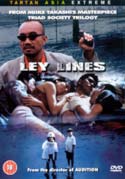
Released on the Tartan Asia Extreme label, Takashi Miike's Ley Lines (1999) is the conclusion to his "Triad Society Trilogy", following on from Shinjuku Triad Society and Rainy Dog. It is also one of his weaker films, despite Tom Mes's sycophantic notes included in the DVD extras.
The "Triad Society Trilogy" is more thematically linked than through action or character - these are films about ethnic Chinese in Japan (or the reverse, like Rainy Dog, about a Japanese Yakuza in Tawain). And in terms of narrative, Ley Lines is the weakest of the stories.
The clichéd story is about two ethnic Chinese brothers, Ryuichi and Shunrin, who leave their small town for the bright lights of Tokyo, along with their simple friend Chan. Once in the big city, they boys quickly become manipulated by the Chinese gangsters working in the Shinjuku region. They make their living selling liquid toluene on the streets and hanging out with the assorted urban detritus - junkies, hustlers and whores. They adopt another ethnic Chinese, Anita, who works as a prostitute for an abusive pimp and together the four dream of running away to Brazil so they can dance the samba (I couldn't make this stuff up!). To fund their escape, they plan a daring robbery of the local crime boss and of course everything goes to shit thereafter.
What is most annoying about Ley Lines is the absence of the Miike cinematic hyperbole; this is a rather straightforward film, with little of the hyper-kinetic violence one expects (or rather hopes for) from this Japanese auteur. Miike sees this film as an homage to the French new wave - particularly the early films of Jean Luc Godard (Vivre sa vie and Bande a part, in particular). He films Ley Lines with an almost verite-style; street level, natural lighting all the way through, naturalistic action, etc. The film feels more like a documentary than a fictional film, certainly giving a greater sense of believability and realism to the proceedings. But, to be honest, this style of filmmaking is one I really find boring - particularly, when someone is trying to imitate Godard, rather than Godard just being himself (which can also be boring, but at least he's being himself). Adding to the Parisian sensibility, the soundtrack score makes ample use of the French accordion - highly incongruous with the Japanese setting, but I guess (at my most generous) furthers that thematic feeling of "not belonging" that Miike is exploring through all three of these films.
To be honest, I'm getting pretty tired of Miike; when he's on his game, in movies like Audition, Dead or Alive or Ichii the Killer - his films are remarkable. But he's also made a lot of pretentious dross too - think Gozu for a more recent comparison. And Ley Lines fits distinctly in the art-house/pretentious cineaste category. Yes, his output is certainly remarkable and he's made some really great films, but I think I'd rather he made fewer movies and spent more time on them, then churn out the three or four a year he seems to be producing.
Be that as it may, Ley Lines, as a Takashi Miike film, will be of interest to many - fans of Miike will buy this to complete their collection, and some film students will think it's profound and artistic. But I doubt this is going to be a Miike film people are going to talk about.
Tartan has once again produced a wonderful print of the film - 1.78:1 anamorphic widescreen - with clear subtitles. The picture looks beautiful and the sound quality is excellent. There are very few extras to speak of - yet another interview with Takashi Miike and some seriously pretentious notes from self-proclaimed Miike expert Tom Mes. The package overall however is lean - good, but lean.
Review by Mikel J. Koven
| Released by Tartan |
| Rated 18 - Region 0 (PAL) |
| Extras : |
| see main review |